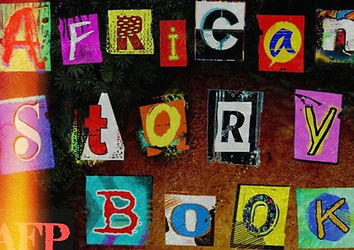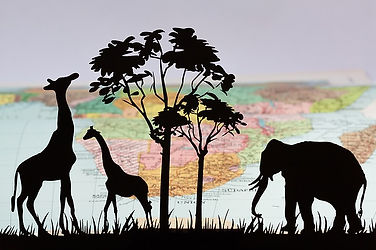

About The AFP



"Culture is Coded Wisdom," Wangari Maathai.
The AFP promotes storytelling as a pedagogical approach to learning and communicating what past cultures and human civilizations have known all along- that our role on this planet is to remain open to new scientific discoveries about the biodiversity of our Earth, expand our collective knowledge about community development and continue building cultures that help us to continually adapt to changes in climate and environment, thus leaving a zero carbon footprint in our wake.
The AFP is a growing bank of stories that promote sustainable development, collected from indigenous communities in Africa. These stories have been reimagined to suit the times that we are in, for all children and global educators around the world. The stories are shared on appointment as school presentations either in-person or virtually.
These stories are intended to encourage all learners and educators to expand their knowledge by incorporating informal, indigenous knowledge systems into mainstream education. This is a bridge between cultures and a link between the past, present and future citizens of the earth. It is an invitation to embed environmental conservation into our daily lives by cultivating ways to listen to what the earth is demanding of its citizens. In so doing, learners are able to form bonds of solidarity with the original custodians of the earth.
The AFP envisions a future generation of global citizens who will be fully equipped with the essential knowledge required to live in harmony in this world and beyond. It is also our mission to inspire the next generation of storytellers to continue passing down these practices, knowledge and wisdom, to continue advancing a culture of protecting our shared planet.
The AFP is inspired by the story below about a hummingbird that saved a burning forest with tiny droplets of water. It was retold by Wangari Maathai, Nobel Peace Prize Laureate (Kenya), who started a movement of planting a green belt of trees across Africa, one tree seedling at a time.
Founder's Story

In 2006, I left Africa and traveled the world- through North America, Asia, and Europe, where I am currently based. That's me pictured the last time I visited the bush in Kenya, at a prehistoric rock formation in the Maasai Mara National Reserve. Along the international travels, I became a mother. I began raising my children in countries far away from the aunties and older women who would have automated the initiation into motherhood, African-style. I tried to keep a little bit of Africa inside me- through the first foods that the babies ate, the way that I carried them wrapped in slings and dangling their tiny feet beside my hips. I kept my hair mostly braided or covered in colorful headscarves. I often wore brightly-colored kanga outfits similar to those draped elegantly on the shoulders of Swahili women living on the coast of Kenya. All this was an effort at keeping an outward identity as African. Over the years, I have learned that Africa lives within, not outside of me. The African culture is channeled through words, the Kenyan-English accent, and the expressions that I use to convey tone and emotions inspired by the Bantu ethnic group of my ancestors. Sometimes it is manifested through laughter, the thoughts that fill my imagination, and the music that my heart responds to. Above all, the values that guide my daily parenting journey spring from a childhood spent learning from old, wise women tending assuredly to their children. In me lives a way of being, a philosophy that is the essence of being African- the Ubuntu way. The continent's collective spirit of oneness is reflected in how I see my reflected humanity in others who are culturally different. In keeping with my Maasai grandfather's footsteps, I am a nomad living far from the places along the foothills of Mt. Kenya that he explored on foot throughout his long life. Yet one thing seems to stay in my heart, unnerved by the constant changes, something I could pack up at a moment's notice and transport discreetly to another home country. It is the stories of our past. These folktales were generously shared with me by grandmothers throughout my childhood. Likewise, I have continued to share them with my children and their friends picked from different countries. As soon as I retell an old story, the memory of another one appears. There is never a shortage of this resource, and each story could be retold with a new twist, giving it a fresh, new angle to suit a diverse audience. Once I fully understood the version of Africa that exists as stories in my heart, I embraced the whole world as my home. I also began broadcasting them in this podcast for children worldwide. As a professionally trained journalist and a certified specialist in creative writing for children, storytelling for me is like water to fish. I dive in and come alive while relishing in all the possibilities of adventure that my mind can conjure up while swimming inside the lives of mythical or legendary characters. Acquiring a master's in Development Education and Global Learning also enabled me to connect the dots between formal and indigenous knowledge systems. I began to find essential knowledge that we can use to progress into happy, prosperous, and healthy citizens of the world. Sadly, fewer grandmothers are sharing these precious stories with young children these days. The stories have not lost their essence, but old story-keepers are leaving this planet with our rich heritage and knowledge about the earth stored inside their minds. Meanwhile, the younger generation has new social interactions that suit their time but have disconnected them from the older generation. This expanding gap between the young and the old compelled me to design the AFP as a digital space where these stories can be recollected. The AFP is a globally accessible classroom offering the gift of African oral storytelling to young children worldwide. I believe that storytelling is the most authentic form of self-expression and has the power to heal differences among cultures and unite the world to promote global citizenship. It is an exciting time to be alive and to be able to share the knowledge and wisdom of my ancestors with the rest of the world. Through this personal journey I can hear the original storytellers coming alive in a medium previously unavailable in their time. This space now serves the great purpose of connecting past, present, and future earth dwellers.